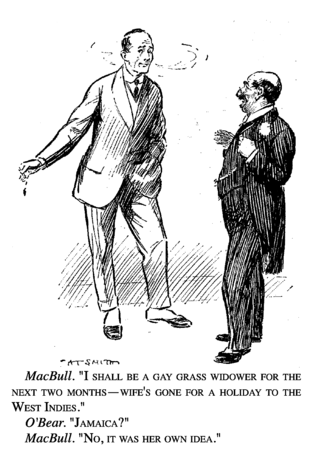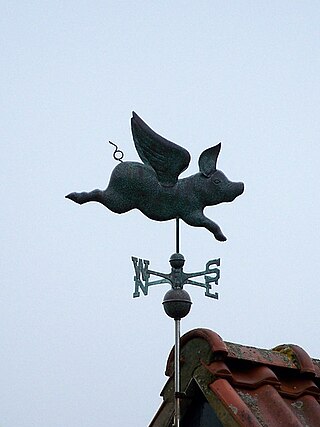The Book of Proverbs is a book in the third section of the Hebrew Bible traditionally ascribed to King Solomon and his students later appearing in the Christian Old Testament. When translated into Greek and Latin, the title took on different forms: in the Greek Septuagint (LXX) it became Παροιμίαι ; in the Latin Vulgate the title was Proverbia, from which the English name is derived.

Ecclesiastes is one of the Ketuvim ("Writings") of the Hebrew Bible and part of the Wisdom literature of the Christian Old Testament. The title commonly used in English is a Latin transliteration of the Greek translation of the Hebrew word קֹהֶלֶת. An unnamed author introduces "The words of Kohelet, son of David, king in Jerusalem" (1:1) and does not use his own voice again until the final verses (12:9–14), where he gives his own thoughts and summarises the statements of Kohelet; the main body of the text is ascribed to Kohelet himself.

A pun, also known as a paronomasia in the context of linguistics, is a form of word play that exploits multiple meanings of a term, or of similar-sounding words, for an intended humorous or rhetorical effect. These ambiguities can arise from the intentional use of homophonic, homographic, metonymic, or figurative language. A pun differs from a malapropism in that a malapropism is an incorrect variation on a correct expression, while a pun involves expressions with multiple interpretations. Puns may be regarded as in-jokes or idiomatic constructions, especially as their usage and meaning are usually specific to a particular language or its culture.
An adjective is a word that describes or defines a noun or noun phrase. Its semantic role is to change information given by the noun.
An idiom is a phrase or expression that usually presents a figurative, non-literal meaning attached to the phrase. Some phrases which become figurative idioms, however, do retain the phrase's literal meaning. Categorized as formulaic language, an idiom's figurative meaning is different from the literal meaning. Idioms occur frequently in all languages; in English alone there are an estimated twenty-five thousand idiomatic expressions.

A figure of speech or rhetorical figure is a word or phrase that intentionally deviates from straightforward language use or literal meaning to produce a rhetorical or intensified effect. In the distinction between literal and figurative language, figures of speech constitute the latter. Figures of speech are traditionally classified into schemes, which vary the ordinary sequence of words, and tropes, where words carry a meaning other than what they ordinarily signify.

OK, with spelling variations including okay, okeh, O.K., ok and Ok, as well as k in texting, is an English word denoting approval, acceptance, agreement, assent, acknowledgment, or a sign of indifference. OK is frequently used as a loanword in other languages. It has been described as the most frequently spoken or written word on the planet.
An aphorism is a concise, terse, laconic, or memorable expression of a general truth or principle. Aphorisms are often handed down by tradition from generation to generation.

In rhetoric, a weasel word, or anonymous authority, is a word or phrase aimed at creating an impression that something specific and meaningful has been said, when in fact only a vague, ambiguous, or irrelevant claim has been communicated. The terms may be considered informal. Examples include the phrases "some people say", "it is thought", and "researchers believe". Using weasel words may allow one to later deny any specific meaning if the statement is challenged, because the statement was never specific in the first place. Weasel words can be a form of tergiversation and may be used in advertising, popular science, opinion pieces and political statements to mislead or disguise a biased view or unsubstantiated claim.
Bollocks is a word of Middle English origin meaning "testicles". The word is often used in British English and Irish English in a multitude of negative ways; it most commonly appears as a noun meaning "rubbish" or "nonsense", an expletive following a minor accident or misfortune, or an adjective to describe something that is of poor quality or useless. It is also used in common phrases like "bollocks to this", which is said when quitting a task or job that is too difficult or negative, and "that's a load of old bollocks", which generally indicates contempt for a certain subject or opinion. Conversely, the word also appears in positive phrases such as "the dog's bollocks" or more simply "the bollocks", which will refer to something which is admired or well-respected.
"May you live in interesting times" is an English expression that is claimed to be a translation of a traditional Chinese curse. The expression is ironic: "interesting" times are usually times of trouble.
La noblesse oblige is a French expression that means that nobility extends beyond mere entitlement, requiring people who hold such status to fulfill social responsibilities; the term retains the same meaning in English. For example, a primary obligation of a nobleman could include generosity towards those around him. As those who lived on the nobles' land had obligations to the nobility, the nobility had obligations to their people, including protection at the least.

23 skidoo is an American slang phrase generally referring to leaving quickly, being forced to leave quickly by someone else, or taking advantage of a propitious opportunity to leave. Popularized during the early 20th century, the exact origin of the phrase is uncertain.
Folk etymology – also known as (generative) popular etymology, analogical reformation, (morphological)reanalysis and etymological reinterpretation – is a change in a word or phrase resulting from the replacement of an unfamiliar form by a more familiar one through popular usage. The form or the meaning of an archaic, foreign, or otherwise unfamiliar word is reinterpreted as resembling more familiar words or morphemes.
To "trip the light fantastic" is to dance nimbly or lightly to music. The origin of the phrase is attributed to John Milton.

"Nigger in the woodpile" or "nigger in the fence" is a figure of speech originating in the United States meaning "some fact of considerable importance that is not disclosed—something suspicious or wrong".
"Call a spade a spade" is a figurative expression. It refers to calling something "as it is"—that is, by its right or proper name, without "beating about the bush", but rather speaking truthfully, frankly, and directly about a topic, even to the point of bluntness or rudeness, and even if the subject is considered coarse, impolite, or unpleasant.

An idiom is a common word or phrase with a figurative, non-literal meaning that is understood culturally and differs from what its composite words' denotations would suggest; i.e. the words together have a meaning that is different from the dictionary definitions of the individual words. By another definition, an idiom is a speech form or an expression of a given language that is peculiar to itself grammatically or cannot be understood from the individual meanings of its elements. For example, an English speaker would understand the phrase "kick the bucket" to mean "to die" – and also to actually kick a bucket. Furthermore, they would understand when each meaning is being used in context.

Popper and After: Four Modern Irrationalists is a book about irrationalism by the philosopher David Stove. First published by Pergamon Press in 1982, it has since been reprinted as Anything Goes: Origins of the Cult of Scientific Irrationalism and Scientific Irrationalism: Origins of a Postmodern Cult.

The phrase "when pigs fly" is an adynaton—a figure of speech so hyperbolic that it describes an impossibility. The implication of such a phrase is that the circumstances in question will never occur. The phrase has been used in various forms since the 1600s as a sarcastic remark.









